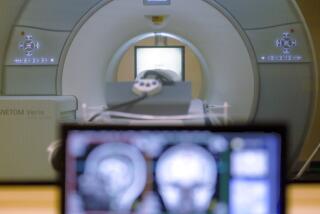Colonoscopy Article Overstates Drawbacks
- Share via
Trudy Lieberman’s article “Matching Colon Tests to Patients, Not Costs” (March 19) left me reeling. Does she have an ax to grind or what? Her article was so one-sided, so vituperative against doctors and colonoscopy screenings that I could only wonder what huge personal insult had been committed against her.
“Finding a competent, experienced doctor may be difficult.” Really? Here in Los Angeles? Maybe in Upper West Slobovia.
HOLLACE BROWN
Los Angeles
*
In trying to bolster her position that a colonoscopy is “a nasty affair,” Lieberman says that a colonoscopy is “uncomfortable” and “requires sedation.” Well, it is precisely because of the sedation that the procedure is not uncomfortable at all. From personal experience, I find it hard to believe that “some patients, after having one test, refuse to repeat the experience.”
As for her statement that “10 to 30 people out of 10,000 who have a colonoscopy will end up with a perforated colon, or bleeding . . . one will die,” I would think that my colonoscopies are probably safer than my drive to the hospital.
RICKARD ROUDEBUSH
Sherman Oaks
*
My internist had encouraged me for years to have one done because colon cancer runs in my immediate family. At the age of 48, I finally agreed to it. They found a polyp, which they quickly removed, and I was fine.
I do not tolerate pain and discomfort well at all, but I was very pleased with the test and receiving a clean bill of health. That was enough to give me a great sense of relief, and it greatly diminished my worries. I highly recommend a colonoscopy.
GLORIA BANDO
Los Angeles
*
Trudy Lieberman’s article on colon cancer sounds as if it is backed by the insurance company mentality. Her scary presentation of the preparation and the procedure will surely confirm to many who have put off a colonoscopy that they don’t need it, and deny themselves a life-saving procedure.
No one wants to talk about the colon and cancer, but it needs to be brought out of the dark ages and have the positive exposure it deserves.
SALLY JOHNSON
Westlake Village
*
An opportunity to educate the public about proper colon cancer screening methods (and on how to find a competent doctor to perform these examinations) was instead used to frighten and further confuse readers. We find nothing redeeming in Lieberman’s musings and, as the first article in this new health series, we are fearful of what will follow. She has also done a tremendous disservice to the physicians, lay people and legislators who have just completed a monumental task in obtaining coverage for this important benefit by Medicare.
DR. DONALD S. DAVID
DR. VINCENT NG
Duarte
*
Although some of the facts Lieberman mentioned are accurate, she manipulates the language to make it appear that colonoscopy is being abused and overused as a diagnostic and therapeutic tool.
By all means, patients should ask the endoscopist about his/her personal training, the number of procedures performed, complication rates and malpractice claims. They should also know that there are stringent regulations around quality control and the use of peer review in all U.S. hospitals.
Although some medical screenings such as mammograms, proctology exams and colonoscopy might be somewhat uncomfortable, the benefits of screening far outweigh the temporary discomfort.
DR. DAVID S. CANTOR
Medical Director
Endoscopy Center, Huntington
Memorial Hospital
Pasadena
*
Perhaps most disappointing is Lieberman’s diatribe against doctors. In her world, doctors are “irksome,” “pushy” and “incompetent”; they are “unscrupulous peddlers” who “stand to make a bundle” and who “size up the customer” to “boost their bottom line.” It is pitiful this world in which Lieberman lives. Fortunately, the real world is (for the most part) filled with doctors who truly care about the patients they care for.
DR. CARY ALBERSTONE
Camarillo
*
In Trudy Lieberman’s column, she makes a number of sweeping statements that question the value of most screening tests for colorectal cancer and contradict positions of the American Cancer Society and the American College of Gastroenterology.
As a gastroenterologist and chair of the American Cancer Society’s Los Angeles colorectal initiative team, I am concerned about cancers that may go undetected if your readers take this misinformation to heart.
Following screening guidelines for colorectal cancer can help detect and remove polyps before they develop into cancers. This is the best way to improve the chance for a cure and reduce deaths. When colorectal cancers are detected at a localized stage, the five-year relative survival rate is 90%; however, only 37% of all colorectal cancers are discovered at that stage.
Testing for fecal occult blood can reduce mortality by 20% to 33%, but sigmoidoscopic screening has been shown to reduce cancer in the lower half of the colon by 70%. For information, call (800) ACS-2345 or log onto to https://www.cancer.org.
DR. DONALD HENDERSON
More to Read
Sign up for Essential California
The most important California stories and recommendations in your inbox every morning.
You may occasionally receive promotional content from the Los Angeles Times.













